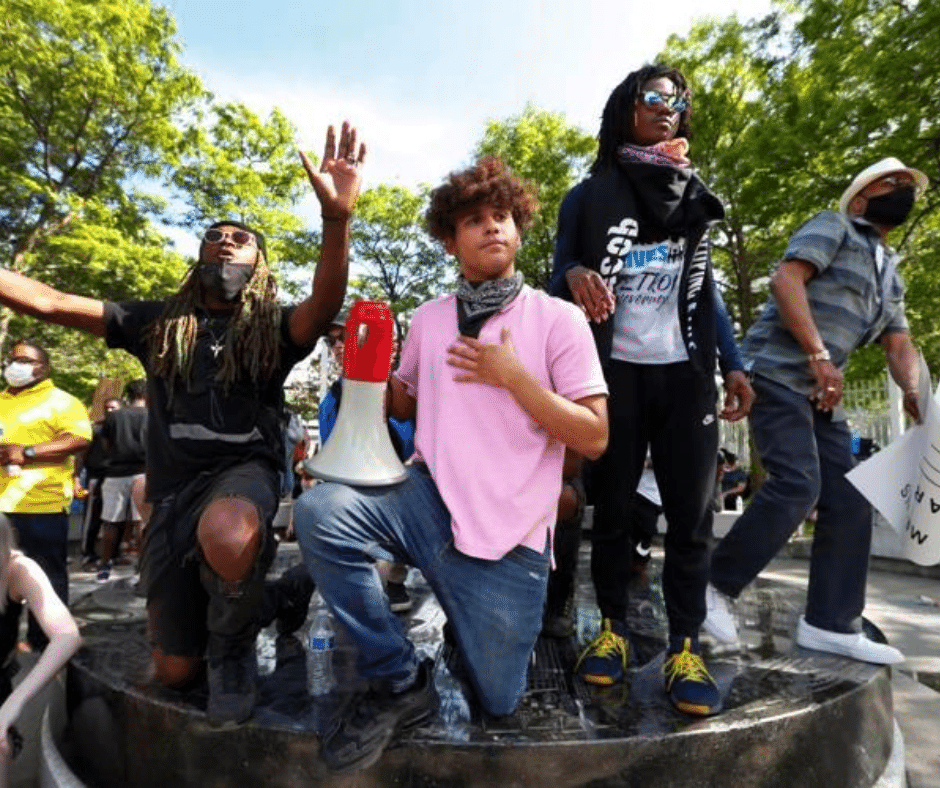
July 23, 2020
Corktown Health Center: Systemic racism has direct impact on health of marginalized groups
By Dr. Latonya Riddle-Jones For MediaNews Group; Jul 20, 2020
-
In this June 3, 2020 file photo, Stefan Perez, second from left, addresses a crowd at a rally in Detroit over the death of George Floyd. The evidence is clear that discrimination leads to negative health impacts, for racial minorities as well as the LGBTQ community. (AP Photo/Paul Sancya)
It’s clear from protests throughout the country since Memorial Day, sparked by the death of George Floyd, that putting an end to systemic racism is the most important issue for many people in this country — people of all ages, races, genders and sexual orientations.
For too many years, treatment of minorities has been a point of shame for this country, from slavery to Jim Crow laws of the past to the issues with police brutality we’ve continued to face.
And what many people don’t realize is that by allowing systemic racism to remain pervasive in America, we have opened the door for other forms of bias and oppression, including against the LGBTQ community. If racism is not properly put in check, other marginalized groups should be cautious of discrimination that may be headed their way by extension, so it’s important to address the issue of racism head on — and at the highest levels possible.
Intersectionality, health impacts
A multitude and depth of inequities in our society creates health disparities among minority populations.
To take it a step further, the theory of intersectionality asserts that people are often disadvantaged by multiple sources of oppression, including race, class, gender identity, sexual orientation and religion.
Often, these multiple factors of discrimination are overlapping and difficult to manage, leading the severe health issues in many who are affected.
For example, 20.8 percent of African Americans and 17.6% of Hispanics live in poverty, compared to 10.1 percent of white people. This means they are more likely to lack health insurance, and are less likely to see a physician regularly or get routine tests like mammograms. It’s easy to see where that will lead, with higher rates of diseases that can prove lethal and lessen quality of life.
For African American and Hispanic individuals who also identify as LGBTQ, the numbers reveal even further disparities. For example, 20 percent of LGBTQ African American adults have diabetes, a rate 2.5 times higher than the rest of the African-American population and four times more than white LGBTQ and heterosexual individuals.
What’s clear is that discrimination leads to negative health impacts, especially when intersectionality and multiple forces of discrimination play a part.
Change at the C Suite level
The medical community is coming out in solidarity against racial discrimination. On June 5, Dr. Ijeoma Nnodim Opara led the “White coats for Black Lives” event in a show of solidarity at the Detroit Medical Center.
The protests of recent weeks have raised the alarm bells of this nation, and it’s amazing to see the young, enthusiastic students fighting this fight. But it’s important to realize that the message needs to get through to leaders at the corporate and political levels — those “at the table” or in the “C-suite”.
If these leaders do not have the knowledge of, or simply remain ignorant to, the injustices that exist within in their institutions around race, creed, sexual orientation and gender, we will never get to where we need to be in the country. And the health and wellness of those being discriminated against will continue to suffer.
At Corktown Health Center, we serve a largely African-American and LGBTQ patient base, so we see these effects firsthand. Our team at Corktown, and the LGBTQ community as a whole, stand in solidarity with the Black Lives Matter movement amid this push for equality sweeping America right now.
As we begin to topple this hatred, what benefits one group will benefit all who face discrimination, especially those who are facing it on multiple fronts.
Dr. Latonya Riddle-Jones is medical director at Corktown Health Center in Detroit, and an assistant professor of Internal Medicine and Pediatrics at Wayne State University School of Medicine. Corktown Health Center is the only health clinic in Michigan focused on treating LGBTQ patients. Visit corktownhealth.org.
Share This Story, Choose Your Platform!
Marx Layne is your competitive advantage.
Your reputation and success are our only concerns.
